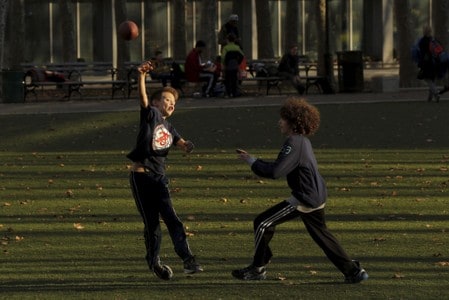By Lisa Rapaport
(Reuters Health) – Children who suffer adverse experiences like abuse and neglect may be less likely to have mental health problems in adulthood if they play team sports as teenagers, a U.S. study suggests.
Adverse childhood experiences, commonly called ACEs, can include witnessing parents fight or go through a divorce, having a parent with a mental illness or substance abuse problem, or suffering from sexual, physical or emotional abuse. ACEs have been linked to what’s known as toxic stress, or wear and tear on the body that leads to physical and mental health problems that often continue from one generation to the next.
The current study focused on whether team sports – which have been linked to a variety of physical and psychological benefits – might diminish the potential for lasting mental health problems among adults with a history of ACEs. Researchers followed 4,888 teens exposed to ACEs and 4,780 teens without this exposure for more than a decade, starting when they were 15 years old on average.
Teens who played team sports had 24 percent lower odds of receiving a depression diagnosis by young adulthood and 30 percent lower odds of receiving an anxiety diagnosis, the study found.
“Our data indicate that team sports participation in adolescence may be associated with better mental health outcomes in adulthood due to increased self-esteem, increased feelings of social acceptance, and feeling more connected to the school environment,” said lead study author Dr. Molly Easterlin of the University of California Los Angeles and Cedars-Sinai Medical Center.
“It may change how kids navigate school or develop relationships,” Easterlin said by email. “It may make them more resilient.”
Among the teens in the study with ACE exposure, 21 percent reported two or more ACEs, according to the study in JAMA Pediatrics.
The most common ACE was having a single parent, which impacted about 27 percent of all study participants, followed by parental incarceration, which impacted 17 percent, and parental alcohol misuse, reported by 14 percent.
Sexual abuse was the least commonly reported ACE, affecting about 5 percent of the teens, followed by physical abuse at 9 percent and emotional neglect at 11 percent.
Much of the connection between team sports and the reduced potential for anxiety or depression appeared to be explained by social rather than physical aspects of sports participation, researchers report in JAMA Pediatrics.
Feeling more connected to the school community, feeling socially accepted, and having a higher self-esteem together explained 16 to 36 percent of the reduced depression and anxiety risk associated with team sports.
The study wasn’t a controlled experiment designed to prove whether or how team sports during adolescence might directly impact mental health in adulthood. It’s also possible that instead of team sports causing better mental health, that the reverse was true and youth with better mental health were more likely to choose to play team sports.
Even so, the results offer fresh evidence of the potential for team sports to help at-risk kids, said author of an accompanying editorial Mercedes Carnethon of the Feinberg School of Medicine at Northwestern University in Chicago.
“Team sports are particularly beneficial for youth because they bring together a group who works together to achieve a shared goal,” Carnethon said by email.
“The lessons learned about helping one another, compromise, persisting through difficulties and dealing with inevitable losses have parallels with life,” Carnethon added. “These lessons can help youth weather the challenges that they face in their personal lives as a result of their adverse childhood experiences.”
SOURCE: http://bit.ly/2EE6Arc JAMA Pediatrics, online May 28, 2019.


